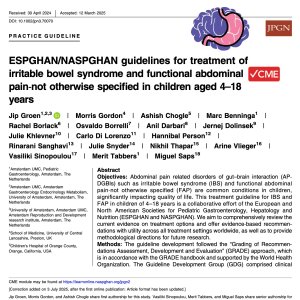There are the 2025 guidelines for IBD - DGBIs
A big take away is hypnotherapy!
Cite
Groen J, Gordon M, Chogle A, Benninga M, Borlack R, Borrelli O, Darbari A, Dolinsek J, Khlevner J, Di Lorenzo C, Person H, Sanghavi R, Snyder J, Thapar N, Vlieger A, Sinopoulou V, Tabbers M, Saps M. ESPGHAN/NASPGHAN guidelines for treatment of irritable bowel syndrome and functional abdominal pain-not otherwise specified in children aged 4-18 years. J Pediatr Gastroenterol Nutr. 2025 Aug;81(2):442-471. doi: 10.1002/jpn3.70070. Epub 2025 May 30. PMID: 40444524; PMCID: PMC12314588.
A big take away is hypnotherapy!
- The Guideline Development Group (GDG) notes that a crucial emphasis should be placed on education regarding the abdominal pain-related disorders of gut–brain interaction (AP-DGBI) diagnosis during initial outpatient consultation sessions. Education should focus on the positive nature of the diagnosis, the relevance of the connection between the gut and brain, the effects of lifestyle and other triggers, and an outline of potential treatment approaches and options.
- The GDG recognizes that dietary treatment options can seem harmless and, therefore, receive consideration as an entry-level treatment option, particularly for motivated families. The GDG wishes to highlight that restrictive diets may require unrealistic or even disproportionate commitment from children and should be employed with the same consideration as all active interventions, with particular caution in children with risk factors for disordered eating.
- The GDG has made “Grading of Recommendations Assessment, Development and Evaluation” (GRADE) recommendations about specific preparations of – probiotic/synbiotic. All other preparations do not have sufficient evidence at a strain level to support such recommendations due to low study numbers and variable outcomes.
- The GDG recognizes that over-the-counter (OTC) analgesics are commonly used. Whereas they may have a role in intermittent or periodic symptom control, the GDG raises caution beyond local OTC dosing and duration guidance.
- The GDG finds that several alternative analgesic treatment classes should NOT be used without input and guidance through an appropriate specialist with expertise in treating therapy-refractory pediatric AP-DGBIs.
- The GDG acknowledges that the use of anticholinergic antispasmodics for symptom control is common in AP-DGBIs, but there is no evidence supporting or rejecting their use as a treatment.
- The GDG suggests loperamide as a treatment option for symptom control in patients with IBS-Diarrhea subtype (IBS-D).
- The GDG suggests bile acid sequestrants as a treatment option for symptom control in patients with IBS-D.
- The GDG suggests against the use of cannabidiol/cannabis.
- The GDG strongly recommends against the use of surgery for the evaluation and treatment of AP-DGBIs.
Cite
Groen J, Gordon M, Chogle A, Benninga M, Borlack R, Borrelli O, Darbari A, Dolinsek J, Khlevner J, Di Lorenzo C, Person H, Sanghavi R, Snyder J, Thapar N, Vlieger A, Sinopoulou V, Tabbers M, Saps M. ESPGHAN/NASPGHAN guidelines for treatment of irritable bowel syndrome and functional abdominal pain-not otherwise specified in children aged 4-18 years. J Pediatr Gastroenterol Nutr. 2025 Aug;81(2):442-471. doi: 10.1002/jpn3.70070. Epub 2025 May 30. PMID: 40444524; PMCID: PMC12314588.
Attachments
Last edited:

